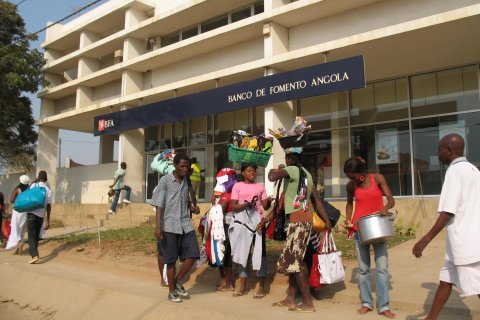During the announcement of the event, opened by Mário Oliveira, Minister of Telecommunications, Information Technologies and Social Communication, Adama and Awa Dieme, two Angolan twin sisters, aged 20, presented their innovative technological project, called "Awama", which helps diagnosing malaria, an endemic disease in the country, without having to draw blood from the patient.
High school finalist students presented the device for the first time, which uses a red light to detect changes in red blood cells, which when affected by plasmodium, the parasite that causes malaria, prevent the passage of this light, at Fititel - Technological Innovation Fair of the Telecommunications Institute, in 2021, the project's disclosure door.
Speaking to the Lusa agency, Adama Dieme said that the project took two years of research, initially launched in a test at Hospital dos Cajueiros, in Cazenga, and currently still being tested at Hospital Josina Machel.
According to Adama Dieme, patients are given the non-invasive test, placing the index finger on the device they created, with results in two minutes, and then the traditional method, with the collection of blood from the individual.
"Then a comparison is made between the two results and it has been coinciding", said the student.
Adama Dieme stressed that research is continuing to improve the project, highlighting the support of the school, with some material, however insufficient, appealing to the Ministry of Health and other institutions for more help.
The young student stressed that malaria is a problem not only in Angola, but throughout the African continent, especially in the sub-Saharan region.
"The disease that causes the most deaths in Angola is malaria, so doing a project that will help treat malaria is what motivates us the most", she said, recalling that the method used is still more time consuming and expensive, because " you need reagents, drying the slides, which are reused and can cause a lot of error".
The research now, highlighted Adama Dieme, is aimed at detecting, for example, the species of plasmodium.
"This will make it a lot easier, because many times when we go to the hospital we are only told that we have two per field, but we don't know the type of plasmodium (...) it is more appropriate to know the species, which [unicellular parasite] protozoan we were bitten," she said.
In addition to financial support, the young students are asking for sponsorship to improve their knowledge in the area of information technologies, with an interest now also in telemedicine.
"Just what we need right now are sponsors to put our project on the market, with improvements", she added.
The Angotic 2023 – International Forum of Information and Communication Technologies of Angola will take place from the 12th to the 14th of June, in Luanda, an open space for the debate of current, global and future issues of ICT (information and communication technologies), promoting knowledge sharing, facilitating networking for government entities, exhibitors, specialists, and presenting innovations, as well as sector trends.
In his speech, the Minister of Telecommunications, Information Technologies and Social Communication stressed that Angotic promises, despite the geopolitical and economic challenges facing the world, "to be a reference African technology event, combining the unrivaled content of a forum with great exposure as well as a networking opportunity".
"Therefore, Angotic serves as a catalyst for collaboration and competition between foreign and local technology companies and a multitude of partners in the ICT ecosystem," he pointed out.







